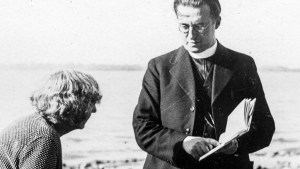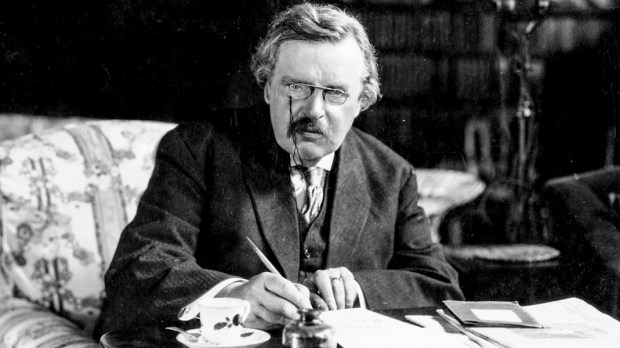You can’t always tell by what they say. Very often the Protestant who seems to love the Church the most never comes close to joining. Sometimes the one who yells and curses and throws chairs whenever the subject comes up winds up at the front of the church being received.
I’ve seen many examples of both. The explanation is simpler than you might think. The person who loves the Church from the outside often loves her the way he loves a painting, or the way an Anglophile American loves England, or the way a scholar loves the college library, or even the way a lecherous man might love beautiful young women. He loves her as a thing he might enjoy or use. The man who throws chairs may know her for who she is and desperately fights to escape, the way the doomed explorer fights quicksand in an old movie.
So how do you suss out when a friend might really be interested in the Church? You don’t want to push too hard too early and drive him away. You also don’t want to miss the clues and not give him the encouragement he needs. G.K. Chesterton gives an answer in his little book The Catholic Church and Conversion. He converted himself, after an agnostic youth and then an acceptance of Christianity that didn’t actually involve going to church very much.
3 Stages
“It is my experience that the convert commonly passes through three stages or states of mind,” he writes. He went through them himself, and gives useful examples from his own experience. Here I’m summarizing about eight pages of the book. If you’re interested in the subject, you’d enjoy that part.
In the first, “he imagines himself to be entirely detached,” but “feels that he ought to be fair to the Church of Rome.” At this point, the eventual convert just says, “Now, wait a minute” when someone says something unfair or unkind about the Church. “It is the stage of simply wishing to protect Papists from slander and oppression, not (consciously at least) because they hold any particular truth, but because they suffer from a particular accumulation of falsehood.”
Your possible convert friend may suddenly say something like, “Catholics are wrong, but they’re not wrong the way X says they’re wrong” or “They’re wrong about most things, but they’re right about that.” Where before he made sweeping criticisms, he may become very concerned to be fair to the Church. Maybe he’s just defending the underdog, but maybe he’s defending this particular underdog because she attracts him and he doesn’t know it yet.
In the second stage, Chesterton says, “the convert begins to be conscious not only of the falsehood but the truth and is enormously excited to find that there is far more of it than he would ever have expected. This is not so much a stage as a progress; and it goes on pretty rapidly but often for a long time.”
This is the easiest and most enjoyable stage, he says — “much easier than trying to live the Catholic life.” He compares it to “discovering a new continent full of strange flowers and fantastic animals, which is at once wild and hospitable.”
Your friend who’s reached this stage will start talking about the cool stuff he’s found in the Church. Because the Church is so big and has so much to offer, he will have found good things suited to his needs and desires. He may well tell you that he doesn’t believe all that Catholic stuff and that he’s not going to become a Catholic, because he knows how he sounds. He may even say rude things about the Church, to try to balance his praise. But he’s on the slippery slope.

Read more:
This is how early Christians decided what to believe
The most terrible stage
The third stage, Chesterton says, “is perhaps the truest and the most terrible. It is that in which the man is trying not to be converted.” He explains this in a passage worth quoting at length. “It is impossible to be just to the Catholic Church. The moment men cease to pull against it they feel a tug towards it,” he explains.
The moment they cease to shout it down they begin to listen to it with pleasure. The moment they try to be fair to it they begin to be fond of it. But when that affection has passed a certain point it begins to take on the tragic and menacing grandeur of a great love affair. The man has exactly the same sense of having committed or compromised himself; of having been in a sense entrapped, even if he is glad to be entrapped. But for a considerable time he is not so much glad as simply terrified.
This stage may take you by surprise. Your friend who was so excited about the Church now takes it all back. He can get picky and petty. The guy who was once so concerned to be fair to the Church now hits her unfairly. But don’t worry. If he’s gone through the first two stages, he may well be acting like this because he’s accelerating down the slippery slope and doesn’t want to hit bottom.

Read more:
Bishop Barron takes on the myth that faith and science are enemies

